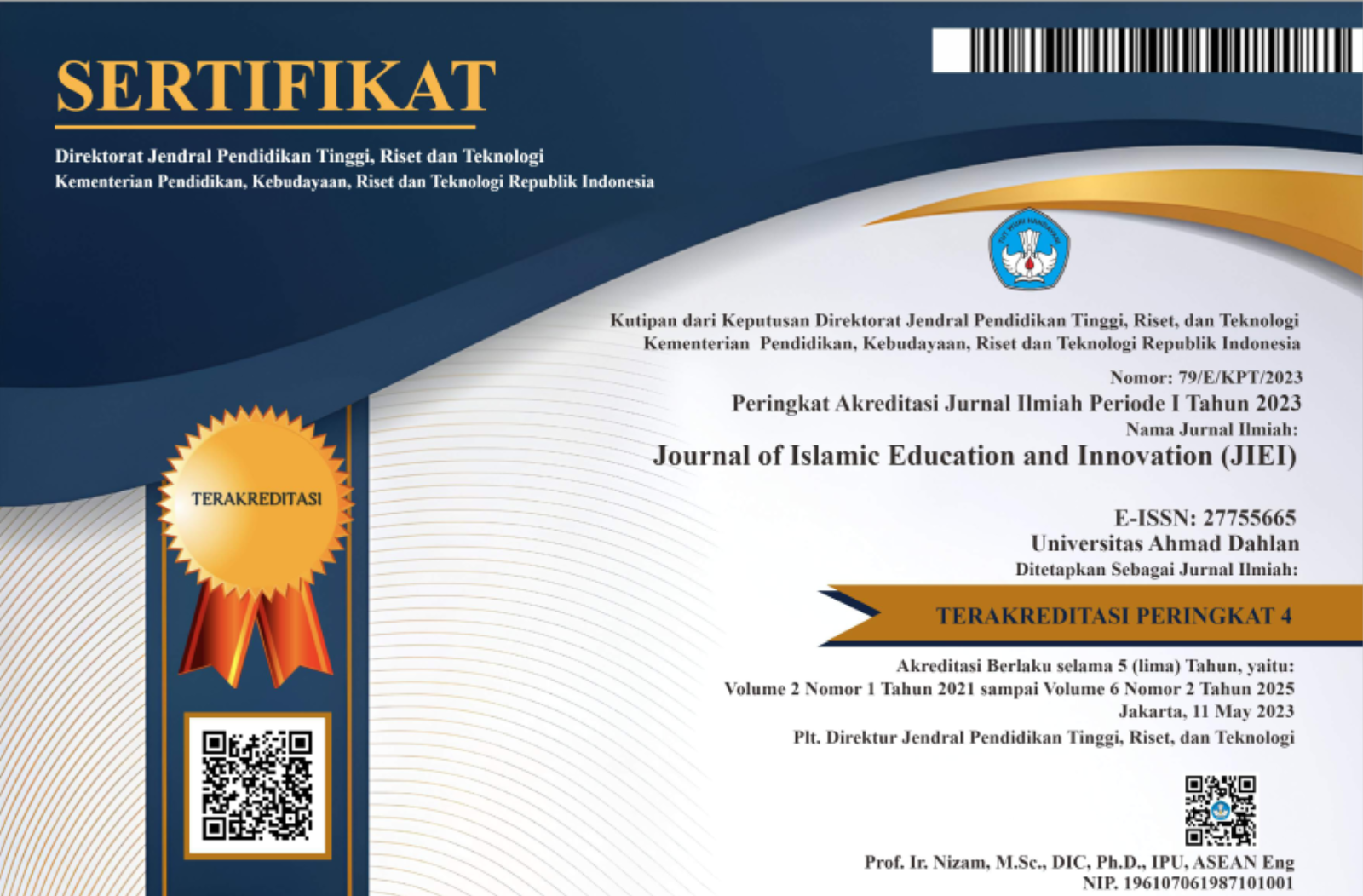(أفكار ابن تيمية وتحديات التربية ا لإسلامية اليوم (دراسة تحليلية نوعية وصفية
DOI:
https://doi.org/10.26555/jiei.v2i1.3859Keywords:
التربية الإسلامية, فكرة ابن تيمية, ابن تيميةAbstract
التربية الإسلامية هي المصدر الرئيس في حياة المسلمين. ووجودُها من أجل زيادة القدرة على الجمع بين الروحانية والعملية وتشكيل مسلم مخلص لله سبحانه وتعالى، تكُون له شخصية نبيلة. في العصر اليوم، هناك الكثير من التحديات التي تواجه التربية الإسلامية، لا سيما المتعلقة بالعولمة والتطورات التكنولوجية، وكذلك تأثير الثقافة الغربية. وإن الغرض من هذا البحث إيجاد حلول للتحديات الحالية في التربية الإسلامية من أفكار ابن تيمية. كان ابن تيمية أحد الفلاسفة المسلمين، واهتم بالتربية الإسلامية اهتماماً كبيراً. وقال كلاماً كثيراً عن التربية الإسلامية، وقال إنه لا يمكن حل جميع المشاكل التي يواجهها المسلم إلَّا بالتربية الإسلامية. استخدم هذا البحث المنهج النوعي الوصفى. والبيانات من الأدبيات الموجودة، ثم تمَّ تحليل البيانات وصفياً، أي عن طريق جمع البيانات وتصنيفها ثم معالجتها. وتشير نتائج هذا البحث إلى أن ابن تيمية قدم عدة حلول في مواجهة تحديات التربية الإسلامية المختلفة، على الرغم من أن التحديات التى واجهتها ليست واحدة بسبب الفترات الزمنية المختلفة. ويمكن استخدام هذه الحلول في أي وقت لأنها تركز على شخصية كل مسلم.
References
C. Sharif El-Tobgui, “Ibn Taymiyya: Life, Times, and Intellectual Profile,” in Ibn Taymiyya on Reason and Revelation, Leiden: Brill, 2019, pp. 78–131.
A. T. A. Putra, “Pemikiran Filosofis Pendidikan Ibnu Sina,” Lliterasi, vol. VI, no. 2, pp. 191–201, 2015.
D. Ilham, “The Challenge of Islamic Education and How to Change,” Int. J. Asian Educ., vol. 1, no. 1, pp. 15–20, 2020, doi: 10.46966/ijae.v1i1.16.
E. K. Poerwandari, Pendekatan Kualitatif Untuk Penelitian Perilaku Manusia. Depok: LPSP3 Universitas Indonesia, 2005.
Sugiyono, Metode Penelitian Kuantitatif, Kualitatif dan R&D. Bandung: Alfabeta, 2013.
م. م. الجراح, أصول البحث العلمي. عمان: دار الراية للنشر والتوزيع, 2014.
N. S. Sukmadinata, Metode Penelitian Pendidikan. Bandung: Remaja Rosda Karya, 2011.
ع. ب. س. القحطانى, “معيار مقترح لتحكيم البحوث النوعية في المناهج وطرق التدريس,” مجلة العلوم التربوية, vol. 4, no. 3, pp. 14–17, 2018.
L. J. Moleong, Metode Penelitian Kualitatif, 36th ed. Bandung: Remaja Rosda Karya, 2017.
أ. ح. أ. الفقيه, “تصميم البحث النوعي في المجال التربوي مع التركيز على بحوث تعليم اللغة العربية,” Int. J. Educ. Psychol. Stud., vol. 2, no. 3, pp. 354–368, 2017.
Matthew B. Miles and A. M. Huberman, Qualitative Data Analysis, 2nd ed. California: SAGE Publications, 1994.
ع. ا. النحلاوي, ابن تيمية. دمشق: دار الفكر, 1986.
م. ب. ع. ا. العريفي, زُبدَة الفوائد من كتب ابن تيمية. الرياض: دار التدمرية, 2009.
ا. تيمية, العبودية. الاسماعيلية: دار الأصالة, 1999.
أ. ا. ع. ا. ا. تيمية, مجموع الفتاوى لشيخ الإسلام, 3rd ed. المنصورية: دار الوفاء, 2005.
ص. ع. ا. م. ع. النبي, الاتجاهات الحديثة للمناهج في التراث العربي الإسلامي. القاهرة: مطبعة جامعة القاهرة, 2018.
إ. م. العَلي, شيخ الإسلام أحمد بن تيمية رجل الإصلاح والدعوة. دمشق: دار القلم, 2000.
م. ح. الزين, منطق ابن تيمية ومنهجه الفكري. بيروت: المكتب الإسلامي, 1979.
ف. ر. أ. خيَّاط, الأهداف التربوية السلوكية عند شيخ الإسلام ابن تيمية. مكة المكرمة: مكتبة المنارة, 1987.
M. A. H. Ansari, Ibn Taymiyyah Expounds on Islam. Doha: Dar al Thaqafah, 1999.
م. ب. ع. ا. المغراوي, المفسرين بين التأويل والإثبات في آيات الصفات. بيروت: مؤسسة الرسالة, 2000.
م. ع. الكيلاني, الفكر التربوي عند ابن تيمية. المدينة: دار التراث, 1986.
ع. ب. ع. ا. س. الجلال, “مقارنة بعض آراء ابن تيمية في التربية والتعليم بأسس التربية الإسلامية,” مجلة التربية, vol. 143, no. 3, pp. 177–211, 2009.
أ. ا. ع. ا. ا. تيمية, درء تعارض العقل والنقل. رياض: جامعة الإمام محمد بن سعود الإسلامية, 1991.
م. ا. الجليند, دَرْء تعارُض العقل والنقل. القاهرة: مركز الأهرام, 1988.
أ. ا. ع. ا. ا. تيمية, شرح الأصبهانية. رياض: دار المنهاج, 2010.
M. N. S. Syah, “Challenges of Islamic Education in Muslimworld : Historical , Political , and Socio-Cultural Perspective,” QIJIS Qudus Int. J. Islam. Stud., vol. 4, no. 1, 2016, [Online]. Available: http://journal.stainkudus.ac.id/index.php/QIJIS/article/download/1580/1449.
Downloads
Published
Versions
- 2021-06-30 (2)
- 2021-05-04 (1)
Issue
Section
License
Copyright (c) 2021 Ahmed Abd al-Athy Abd al-Aziz Ismail

This work is licensed under a Creative Commons Attribution-ShareAlike 4.0 International License.
License and Copyright Agreement
In submitting the manuscript to the journal, the authors certify that:
- They are authorized by their co-authors to enter into these arrangements.
- The work described has not been formally published before, except in the form of an abstract or as part of a published lecture, review, thesis, or overlay journal. Please also carefully read the International JIEI Author Guidelines at http://journal2.uad.ac.id/index.php/jiei/about/submissions#onlineSubmissions
- That it is not under consideration for publication elsewhere,
- That its publication has been approved by all the author(s) and by the responsible authorities “ tacitly or explicitly “ of the institutes where the work has been carried out.
- They secure the right to reproduce any material that has already been published or copyrighted elsewhere.
- They agree to the following license and copyright agreement.
Copyright
Authors who publish with the Journal of Islamic Education and Innovation agree to the following terms:
- Authors retain copyright and grant the journal right of first publication with the work simultaneously licensed under a Creative Commons Attribution License (CC BY-SA 4.0) that allows others to share the work with an acknowledgment of the work's authorship and initial publication in this journal.
- Authors are able to enter into separate, additional contractual arrangements for the non-exclusive distribution of the journal's published version of the work (e.g., post it to an institutional repository or publish it in a book), with an acknowledgment of its initial publication in this journal.
- Authors are permitted and encouraged to post their work online (e.g., in institutional repositories or on their website) prior to and during the submission process, as it can lead to productive exchanges, as well as earlier and greater citation of published work.









